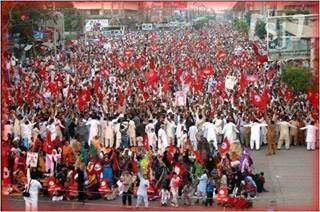Honest, paywall-free news is rare. Please support our boldly independent journalism with a donation of any size.
People in the Punjab province celebrated Republic Day in Pakistan on March 23, with an entirely opposite event ‘Sindh Freedom March’ held in Karachi. CNN claimed there were at least “5 million Sindhis” in attendance while some Sindh-based media quoted a figure of 8 million. The Freedom March celebrated under the banner of a Jeay Sindh Qomi Mahaz (JSQM), a Sindh freedom secessionist party, and demanded a separate, independent status for Sindh province.
The people from across the province, particularly from the Karachi city, were wearing Sindhi caps and special printed shawls called Ajrak. The large group rallied at Tibet Centre with the protesters holding party flags and chanting slogans for freedom of the Sindh from the Pakistan, like “Sindh Ghuray thee Azadi” (Sindh wants freedom). The ‘Freedom March’ (a National Anthem of Sindh) was also sung in chorus by the millions of the people.
JSQM’s chairman Sunan Qureshi gave a speech in which he blamed security and intelligence agencies of Pakistan for killing his own uncle Maqsood Qureshi and fellow JSQM leader Salman Wadho. They were found dead with their bodies burned two days ago in mysterious circumstances in the Naushahro Firoze district of Sindh. In Qureshi’s rallying speech he called the slain men “Martyrs of Freedom March.” He also alleged that his father Bashir Khan Qureshi was poisoned to death as a result of his participation in the 2012 Freedom March. To conclude his speech he appealed to the UN and world powers to help Sindhis get independence from Pakistan. After the address, a funeral prayer for Maqsood and Wadho was performed by the protesters.
The dominant political party in the Sindh capital of Karachi is the Mutahida Qomi Movement (MQM) made up of primarily Urdu-speaking people. After the deaths of the JSQM leaders, a MQM delegation was sent to Sunan Qureshi’s home to express their solidarity and condolences. However, at the Freedom March Qureshi warned the MQM to distance itself from the policy of divide and rule by the Pakistani establishment.He also said that the Urdu-speaking people “are equal brothers” and part of Sindhi nation.
In addition to the JSQM, representatives of other Sindh rights political parties attended the protest including Sindh United Party (SUP), Sindh National Party (SNP), Jeay Sindh Mohaz (JSM), Sindh Tarqi Passand Party (STPP), Qaumi Awami Tehreek (QAT) and more as they banded together with Qureshi to appeal the United Nations, United States of America, UK, France, Russia, China and other powers of the world to support the independence of Sindh.
Matching Opportunity Extended: Please support Truthout today!
Our end-of-year fundraiser is over, but our donation matching opportunity has been extended! All donations to Truthout will be matched dollar for dollar for a limited time.
Your one-time gift today will be matched immediately. Your monthly donation will be matched for the whole first year, doubling your impact.
This matching gift comes at a critical time. As Trump attempts to silence dissenting voices and oppositional nonprofits, reader support is our best defense against the right-wing agenda.
Help Truthout confront Trump’s fascism in 2026, and have your donation matched now!
